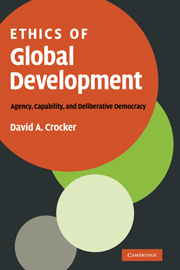Book contents
- Frontmatter
- Contents
- List of figures
- Acknowledgments
- 1 Introduction
- Part I Development ethics
- Part II The capability approach: ethical foundations
- Part III Strengthening and applying the capability approach
- Part IV Deliberative democracy, participation, and globalization
- 9 The capability approach and deliberative democracy
- 10 Deliberative participation in local development
- 11 Development ethics, democracy, and globalization
- Index of names
- Index of subjects
9 - The capability approach and deliberative democracy
Published online by Cambridge University Press: 22 September 2009
- Frontmatter
- Contents
- List of figures
- Acknowledgments
- 1 Introduction
- Part I Development ethics
- Part II The capability approach: ethical foundations
- Part III Strengthening and applying the capability approach
- Part IV Deliberative democracy, participation, and globalization
- 9 The capability approach and deliberative democracy
- 10 Deliberative participation in local development
- 11 Development ethics, democracy, and globalization
- Index of names
- Index of subjects
Summary
In this chapter I argue for three claims. First, Sen's normative assumptions – the concepts of agency, capability, and functionings, which I analyzed, evaluated, and applied in earlier chapters – enable him to argue persuasively for democracy's three-fold importance. Second, Sen's capability approach to social ethics and international development requires democracy conceived as public discussion as well as fair and free elections. Third, Sen's conception of democracy and democratically oriented development would be fruitfully enriched and specified by explicitly drawing on some features of the theory and practice of what is called “deliberative democracy.” I discuss and evaluate recent work on the nature, merits, challenges, and limits of deliberative democracy and argue that this perspective is an important resource for the capability approach in its efforts to deepen democracy, design participatory institutions, and make democracy central to development challenges of our times. In the next chapter, I apply a deliberative version of the agency and capability approach to local development projects. In the volume's last chapter, I show how development ethics would employ this approach in arguing for the democratization of globalization as well as the globalization of democracy.
Sen's capability approach and democracy
Sen's normative assumptions enable him to argue for democracy's three‐fold importance and that, in turn, democratic discussion and decision-making are not only permitted but also required by his normative vision.
Information
- Type
- Chapter
- Information
- Ethics of Global DevelopmentAgency, Capability, and Deliberative Democracy, pp. 297 - 337Publisher: Cambridge University PressPrint publication year: 2008
